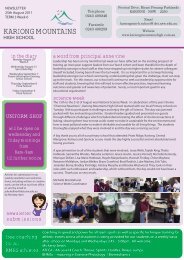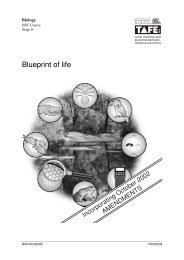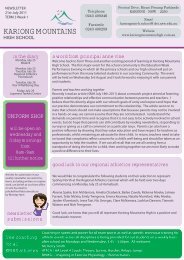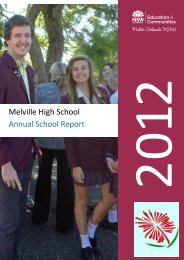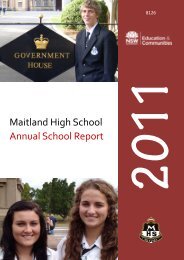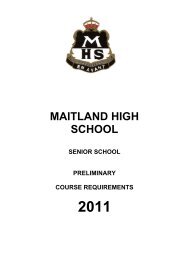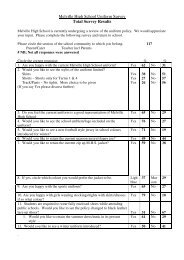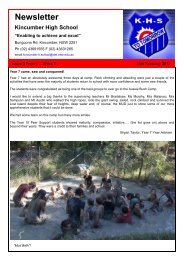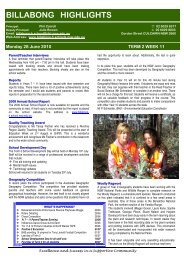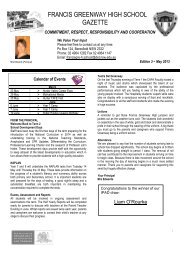Annual School Review - Kincumber High School
Annual School Review - Kincumber High School
Annual School Review - Kincumber High School
You also want an ePaper? Increase the reach of your titles
YUMPU automatically turns print PDFs into web optimized ePapers that Google loves.
‣ implementation of Digital Education<br />
Revolution (DER) strategies for<br />
laptops;<br />
‣ effectiveness of programmed<br />
strategies for ICT competencies;<br />
‣ our below average results in Year 10<br />
<strong>School</strong> Certificate (SC) Computing<br />
Skills Test in 2010.<br />
The focus of this review is to report on and<br />
make recommendations about the:<br />
‣ implementation of processes<br />
supporting the use of DER laptops<br />
for staff and students<br />
‣ embedding of ICT competencies in<br />
KLA programs.<br />
An internal review team was formed to collect<br />
information for analysis from the following<br />
sources:<br />
‣ relevant school documentation,<br />
policies, practices and programs;<br />
‣ surveys of students in Years 9 and 10,<br />
plus staff;<br />
‣ interviews with selected Year 9 and<br />
10 students, selected KLA HT’s and<br />
key personnel in managing ICT;<br />
‣ focus group meetings with<br />
representatives of each KLA.<br />
Findings<br />
Implementation of processes supporting<br />
the use of DER laptops for staff and<br />
students<br />
Feedback has identified positives and<br />
negatives with the implementation of the DER<br />
laptop program. Not all staff and targeted<br />
Year 9 and 10 students responded to their<br />
survey.<br />
Managing and maintaining the laptop was a<br />
problem for students with 11% indicating at<br />
the time of the survey that their laptop was<br />
not in working order, while 52% of Year 10<br />
and 28% of Year 9 indicated they did not<br />
regularly bring their laptop to school fully<br />
charged each day. 34% of staff indicated that<br />
the majority of their students did not regularly<br />
bring their laptop to class for use. Student<br />
feedback indicated a variety of reasons for<br />
this, including, limited opportunities for use,<br />
preferring to use book and pen and forgetting<br />
to recharge. Despite this a majority of<br />
students indicated they were using their<br />
laptop at home for school related tasks<br />
including internet research, assessment tasks<br />
and homework.<br />
Those students engaging with their laptop at<br />
school most regularly did so in English,<br />
Geography and Health classes, especially for<br />
the purposes of internet research and note<br />
taking. In total approximately 70% of students<br />
bringing their laptop found the One Note and<br />
Word programs beneficial for organising their<br />
class notes across most subjects. Many of<br />
these students commented that ‘it was faster<br />
/ easier than writing and allowed better<br />
presentation of work’, while some also<br />
indicated it ‘allowed them to boost their<br />
technology skills’. On the contrary view, a<br />
common comment was ‘I don’t use my laptop<br />
unless it is required’.<br />
Teachers indicated they are increasingly<br />
confident in using their laptop and preparing<br />
and implementing laptop-based lessons.<br />
They commented favourably about the staff<br />
laptop orientation program but despite regular<br />
in-school professional learning at SDD’s and<br />
staff meetings during the DER<br />
implementation period, they felt that still more<br />
PL opportunities were needed to up-skill in<br />
the use of the laptop software. This was<br />
especially relevant for temporary staff, who<br />
relied predominantly on KLA colleagues for<br />
guidance.<br />
Embedding of ICT competencies in KLA<br />
programs and teaching and learning<br />
strategies<br />
Analysis of KLA Year 7 to 10 programs<br />
supports that ICT competencies are included<br />
in units of work as per the Computing Skills<br />
Matrix. Explicit teaching of ICT skills is<br />
focused in the TAS KLA in Stage 4<br />
Technology Mandatory where students have<br />
one term in both Years 7 and 8, developing a<br />
project involving a variety of information<br />
technologies. Integrated ICT strategies are<br />
incorporated in class and assessment tasks<br />
across other KLA’s in mandatory subjects for<br />
both Stages 4 and 5, while elective subjects<br />
in Stage 5 also integrate various<br />
competencies. Increasing support via a<br />
change in focus of the school Computer<br />
Coordinator role assisted KLA’s in this<br />
integration process throughout 2011,<br />
contributing to more effective implementation<br />
strategies. Access to resources such as<br />
12




